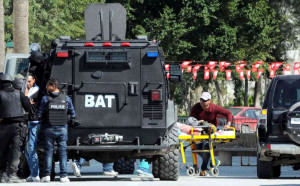
It should be noted that Tunisian authorities raised the level of terrorist threat back in March, when armed Islamists stormed the Bardo Museum, killing 20 foreign tourists. Armed clashes between Islamists and local police units have become commonplace in Tunisia since 2011, when the Ben Ali regime was toppled as a result of the “Arab Spring” movement that was initiated by Washington. From that moment on hundreds of civilian lives were taken in countless terrorist attacks. Here’s just a few of them:
In January 2011 armed skirmishes in the city of Rouhia claimed the lives of two people, later that year a terrorist group that was planning attacks in Tunisian tourist areas was eliminated in the suburbs of this city. Militants were armed with grenades, explosives and Kalashnikov rifles. In 2012 Tunisia was shaken by numerous clashes with Islamic militants, mainly in the northwest and the center of the country.
In 2013 terrorists were particularly active in Tunisia: they murdered two politicians in broad daylight, ambushed an army patrols in the vicinity of the Chaambi mountains and started hunting National Guard soldiers, which left the country paralyzed in fear. On February 6 of that year Al-Qaeda militants murdered a prominent leader of the left – Chokri Belaid. In April three mines in the Chaambi mountains were detonated, claiming the lives of several soldiers of the National Guard. On May 6 a fourth mine in the Chaambi mountains exploded. The month of July was marked by a new political assassination – Mohamed Brahmi, the founder and leader of the People’s Movement was shot in front of his wife and children. Later that month Al-Qaeda ambushed and killed seven soldiers of the regular army. Officials responded with aircraft raids and heavy artillery bombardments of terrorists camps in the Chaambi mountains. In October a 22 year old Tunisian, Mohammed Issaoui, detonated himself at the tourist beach of Riadh Palms in the town of Sousse.
In 2014, after a massive amount of criticism for failing to suppress terrorists, Tunisian political elites launched a massive assault against terrorists groups. Militants were arrested all year long, yet Al-Qaeda carried on its activities in the Chaambi mountains. Still, police and army patrols were being ambushed regularly in Tunisia, which escalated the tense situation in the country even further.
Until 2011 Tunisia was widely perceived as one of the most stable countries in the whole region, but those days are long gone now, as terrorism is raising its head in this North African country. The so-called “Arab Spring” that was imposed by Washington upon the Muslim world to reshape the Middle East and consequently increase its dependence on the United States has failed in providing a solution to modern problems across Arab societies. Now, so-called “Arab democratic socialism” is replaced by a new project – ISIL, that is armed and funded by the US, along with Wahhabi monarchies of the Persian Gulf.
This so-called project is fueling a growing Islamist opposition in Tunisia that is still being labeled by Western media sources as “moderate forces”, just like in Syria. While those “moderate forces” are desperate to demonstrate their desire to cooperate with the West, in reality they are nothing more than brutal militants. This statement can be proven by the fact that the largest group of foreign volunteers fighting in ISIL ranks in Syria and Iraq is of Tunisian origin. These very forces are trying to destabilize the government in Tunisia and come to power.
For its part the White House is eager to propose a solution to this phenomenon – governments in the the Middle East and Africa must allow even more American troops in their respective countries. Jacob Walles, the US ambassador to Tunisia has already proposed this “solution” to the Tunisian government but was turned down.
That this latest brutal terrorist attack was carried out in Tunisia is perfectly logical, since tourists from the West are a common sight in this country, while Islamist groups have openly declared a war against Western Europe and the United States. The West is willing to ignore the Islamic State as long as it fights the government of Bashar al-Assad in Syria, while regular Western citizens are paying with their lives for these arrogant and short-sighted policies of their politicians. However, Arab nations are paying a price of their own for somebody else’s wrongdoing, including Tunisia, which is going to lose its share of the tourist market for a considerable amount of time, with tourists serving as the main source of income for this North African country.
Under these conditions one could only hope that European elites will stop playing sanction games while a fire storm is erupting just around the corner that is going to reach Europe as well. That’s why every single sane politician must admit that international players must unite their efforts if they are to vanquish the “plague of the 21st century” – terrorism.
Vladimir Odintsov, political commentator, exclusively for the online magazine “New Eastern Outlook”.
